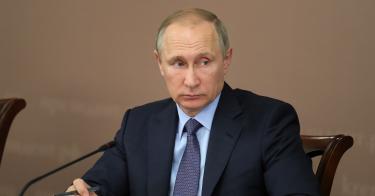It’s baaaack, Tovarishch: After a hiatus of some 25 years, the Pentagon’s unclassified report on Soviet, er, Russian military might is being published again by the Defense Intelligence Agency.
The new report, “Russia Military Power: Building a Military to Support Great Power Aspirations,” which began as “Soviet Military Power” during the Reagan administration, does a fine job on a timely topic.
Since it’s the dog days of summer, Comrade, and you’re probably on a short vacation at the dacha, here are some key takeaways from the 100-plus page report:
First, the Defense Intelligence Agency, or DIA, believes that “Moscow undoubtedly views the United States and its NATO partners as the principle threat to Russian security, its geo-political ambitions, and most importantly, the Kremlin’s continued hold on power.”
The U.S. military intelligence agency also concludes that Moscow assesses that the United States and NATO seek to dominate the international order, contain Russia and deprive it of its “rightful [dominant] place on the world stage.”
Hey, Moscow, the Cold War called and it wants its worldview back!
Moving into the 21st century, the report’s cyber section is super, providing a potent — and apolitical — primer for those grappling with understanding current concerns over Russian cyber shenanigans.
Indeed, the DIA reports that the Russians are running a massive cyber campaign — which Moscow calls “information confrontation” — to control the “global information environment.”
Russia “weaponizes” information as part of a psychological warfare campaign to “influence, confuse, and demoralize its intended audience, often containing a mixture of true and false information.”
It’s good, old-fashioned Soviet “active measures” — with a modern twist.
Today, the Kremlin harnesses “bots [servers to distro emails, etc.] and trolls [online provocateurs] on social media, search engine optimization, and paid journalists” in Western/foreign media to push its message.
And check this: The report claims that Moscow “employs a troll army of paid online commentators who manipulate or try to change the narrative of a given story in Russia’s favor.”
Indeed, the Kremlin’s Internet Research Agency (that is, the troll army) blogs and tweets government propaganda in support of Moscow’s international political agenda, helping friends and targeting foes.
But it’s not just cyber that’s worrisome.
Strategically, Russia still relies heavily on a diversified nuclear force (strategic and tactical nukes). Moscow is modernizing it, spending $28 billion by 2020 to upgrade these forces, according to DIA.
Just like during the Cold War, the Kremlin keeps a vast network of deep underground facilities connected by tunnels and subways that can house as many as 10,000 people during a crisis or conflict — including a nuclear war.
And yes, Dr. Strangelove, its military has one of “the most potent missile forces in the world” and is giving “high-priority” to upgrading its mobile and silo-based ICBM force.
It’s also no surprise that Russia is using the Syrian intervention as a proving ground for new conventional weapons (for example, sea- and air-launched cruise missiles), which simultaneously sends a strong signal to possible adversaries (that is, U.S./NATO).
The study has lots of other good, geeky information (with footnotes) about Russia’s recent military history, doctrine and weapons, too.
You’ll not be disappointed, Citizen.
Indeed, after reading this Russia report, you can’t help but feel — like that old Beatles song—that you’re back in the USSR.
This piece originally appeared in The Boston Herald



